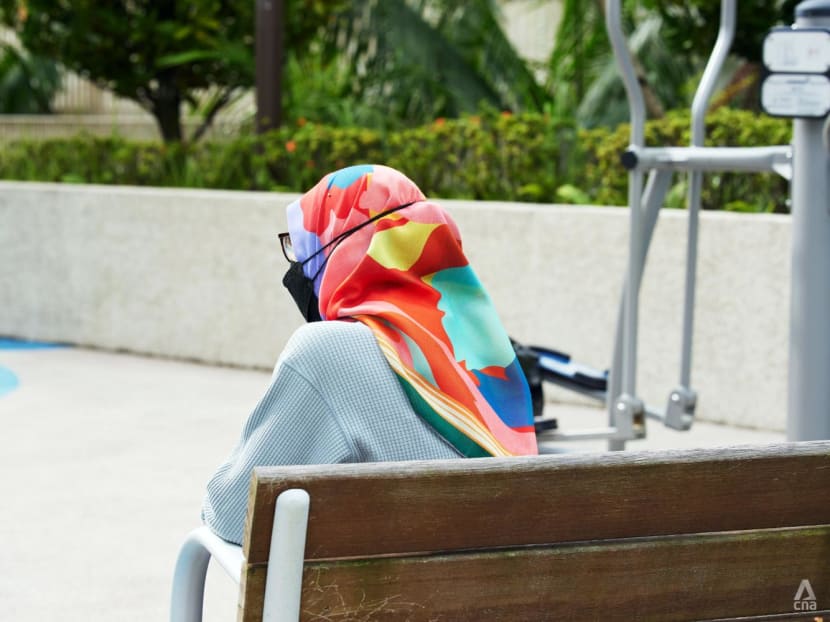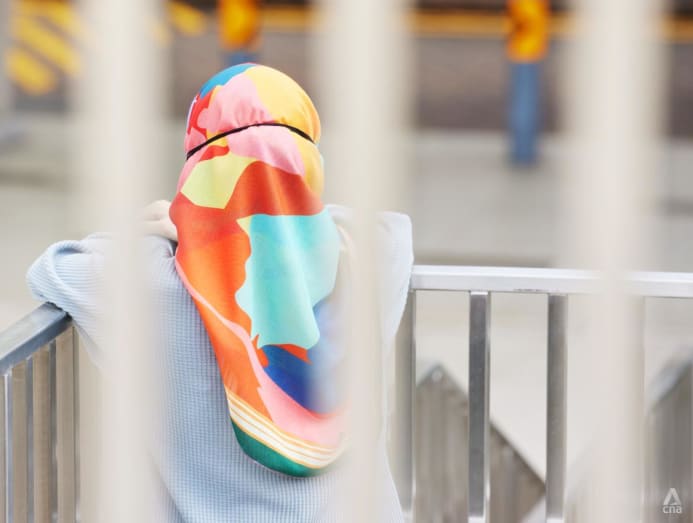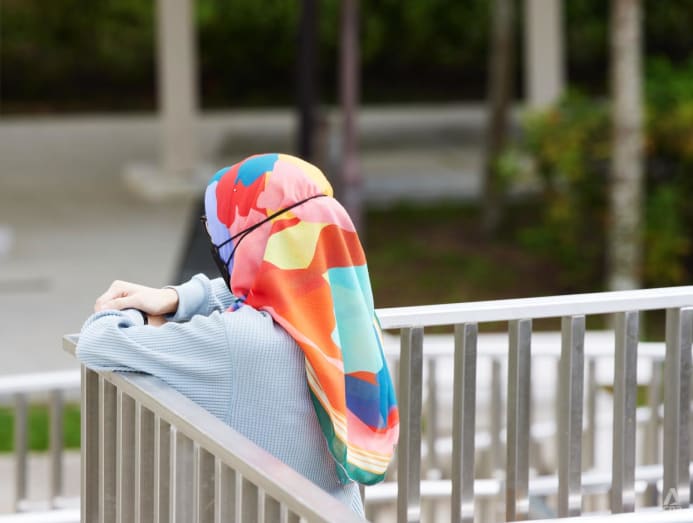'I didn’t want to die in pain': This young mum had stage 4 tongue cancer when she was 29
Aslin Harminah Anuar had to have half her tongue and all the lymph nodes in her neck removed in 2015, leaving her with difficulty speaking and eating. She recounts how she survived having late-stage tongue cancer. As told to CNA Women’s Sharon Salim.

Aslin Harminah Anuar reflects on how she overcame Stage 4A tongue cancer, including an arduous recovery process involving months of speech therapy. (Photo: CNA/Kelvin Chia)
It was in December 2014 that I realised I was getting a mouth ulcer quite often. It would appear in the same spot – at the back of the left side of my tongue – then subside for a few weeks before reappearing.
In April the following year, when I was on holiday with my husband and eldest child, who was then three years old, I noticed that the ulcer was growing bigger. It was bleeding too – and that was when I felt something was amiss.
After we returned to Singapore, I came down with a fever, and felt uneasy about it. I went to a general practitioner who gave me an ulcer cream to apply, but it didn’t subside, even after three days.
The moment the dentist saw the ulcer, her face changed and I knew that something was definitely wrong.
I then went to a dentist, who looked at the ulcer and said something wasn’t quite right. He suggested I see an oral specialist.
I managed to find one but the earliest appointment was in August, which was three months away. I was panicking slightly by then, and went to see another dentist instead.
FINDING OUT IT WAS CANCER
The moment the dentist saw the ulcer, her face changed and I knew that something was definitely wrong. She said she suspected it was cancer, and that she’d need to do a biopsy to be sure.
The dentist set up an appointment with an oncologist for me. I did the biopsy, and one week later, the results confirmed it. I had cancer.
I met with the oncologist a few days later, and he suspected it was stage two tongue cancer. He told me that it wasn’t so bad, and I’d be able to survive with surgery (which would remove the small cancerous portion on the left side of my tongue).
He assured me that everything would be fine, and that there wasn’t a need to go for chemotherapy or radiation therapy. The surgery was scheduled for a few weeks after.
WHAT YOU SHOULD KNOW ABOUT TONGUE CANCER
What it is: The tongue is the most common site for cancers of the oral cavity, said Clinical Assistant Professor Natascha Ekawati Putri, a consultant at the Department of Head and Neck Surgery, Division of Surgery and Surgical Oncology at Singapore General Hospital and National Cancer Centre Singapore. It’s because “cancer cells most often arise from the superficial layer of cells that line the surface of the tongue”, she explained.
What causes it: Chronic exposure to environmental carcinogens such as tobacco (from smoking), and alcohol consumption are established causes, along with the human papillomavirus (HPV), said Clinical Asst Prof Putri.
Incidence rates in Singapore: There were 411 new cases of tongue cancer in Singapore between 2013 to 2017, according to the Singapore Cancer Registry 50th Anniversary Monograph. Oral cancer patients in Singapore used to mostly be in their 60s and 70s but Clinical Asst Prof Putri said more now are in their 50s and 60s, although the reasons are “unconfirmed”.
Treatment and prognosis: “Treatment typically involves surgery to remove the cancer; radiation therapy and chemotherapy; and/or targeted drug therapy – in addition to the surgery – if the cancer is found to be at an advanced stage.
“As the tumour progresses, the portions of the tongue that need to be removed become more extensive, and additional treatment may be required,” she added. When detected early, the chance of treating tongue cancer is high.
GETTING CANCER SURGERY WHILE PREGNANT
A few days after the consultation, I found out that I was pregnant with my second child.
I remember asking my doctors repeatedly if my pregnancy would be affected since I would need to undergo general anaesthesia during the four-hour surgery. My gynaecologist reassured me that it was safe to go for the operation.
A few days after the consultation, I found out that I was pregnant with my second child.
My medical team had planned to do CT and MRI scans to prepare for the surgery but because I was pregnant, they could only do a neck ultrasound. I was sent home after that as the team wanted to discuss the results with my doctor.
The evening before the surgery, I checked into the hospital as planned. One of the doctors assisting my surgeon visited me and said that the ultrasound showed that the cancer had spread. Instead of merely removing the cancerous spot, they would now need to remove a portion of my tongue and also cut my neck to remove the lymph nodes there.
Everything was happening so fast. I was so shocked and unsure. I asked my doctor if I had done something wrong with regards to my lifestyle. I asked my mum if I had committed a “big” sin. Both my husband and my mum said no, it was just something that we had to face.
I had been feeling angry about my cancer diagnosis but now I just felt so sad. I felt resigned to the situation and I didn't know what to do. My mind was a blank.
COPING WITH UNCERTAINTY POST-SURGERY
I spent about a week after the surgery in the hospital. During that time, I could see that my parents, husband and siblings looked very sad. I could see that they had been crying.
The first thing I asked my mum was if the gynaecologist had checked my baby on the ultrasound to make sure he or she was okay. She assured me that everything was fine but that the surgery had taken about eight hours.
Up until then, I had not looked in the mirror. When I finally did, on the fourth day after the surgery, I understood why everyone looked so sad – the scar on my neck was about 15cm long.

When I came home after the surgery, my three-year-old daughter didn’t want to come near me. My post-surgery state must have shocked her quite a bit. I had no energy to hold her or do anything. I would lie on the bed and my sister would play with her beside me, and I’d watch them.
A week later, when I went back to the hospital to remove the stitches, my doctor told me what they had found during the operation.
When I came home after the surgery, my three-year-old daughter didn’t want to come near me. My post-surgery state must have shocked her quite a bit.
The cancer had spread and advanced to Stage 4A, he said, and it was no longer confined to the left side of the tongue; it had moved to the right side. To contain the spread, my doctors had removed all the lymph nodes in my neck and half of my tongue.
When you hear the words Stage 4, even if you don’t know anything about cancer, you’d think that you’re most likely going to die, and that you don’t have much time left.
My doctor explained that Stage 4A oral cancer is not the same as lung or colon cancer where the chances of recovery are very low. I still had a chance to make it through, I was told.
STARTING URGENT CANCER TREATMENT AND DECIDING ON HER PREGNANCY
Because the cancer had spread on my tongue and to the neck, I now had to do radiation and chemotherapy. The first thing that came to my mind was: What’s going to happen to my baby? I was feeling so fearful.
When you hear the words Stage 4, even if you don’t know anything about cancer, you’d think that you’re most likely going to die.
My doctor referred me to a radiation oncologist, who told me that I needed about 32 sessions of radiation therapy, and three cycles of chemotherapy.
My husband and I talked and it was as if we both knew that the chances of keeping our baby were low. Despite wanting a second child, we decided to terminate the pregnancy – I was 10 weeks pregnant at that time.
That was the most difficult part of the whole ordeal, and one of the most painful decisions I've ever had to make as my husband and I had always planned to have a big family. I didn’t want to remember anything about it.
I had to undergo more tests to determine which parts of my body needed radiation therapy. I asked my doctor to be honest with me: What were my chances of survival?
Her reply was that it would all depend on the scan – if the cancer cells had not spread to my major organs, I had a 60 per cent chance of surviving; if it had spread, I’d probably have only six more months to live.
I didn’t want to die in pain, and in the hospital. I wanted to die comfortably at home, with my mum, dad and husband.
If the cancer cells had not spread to my major organs, I had a 60 per cent chance of surviving; if it had spread, I’d probably have only six more months to live.
I remember exactly what I told my family then: If the scan showed that the cancer cells had spread, I didn’t want any treatment. I just wanted to be home. My mum and husband were very sad as they wanted me to fight on but I said no.
On the day that I got the scan results, the radiation oncologist told me that the cancer had not spread and there was still a chance of survival. She said they were “going all out” in the treatment plan to make sure I would survive, as I was only 29 then.
I held on to that chance and clung on to hope. I had everything going for me – I had one child, I was at the peak of my career as a public service officer and I had a bright future ahead.
‘I ALMOST COULDN’T RECOGNISE MYSELF’
My mum accompanied me to the first chemotherapy session. But when I entered the ward, I started walking backwards because I was so scared. I could hear people vomiting, even as they were fighting for their lives.
I wanted to run away and go back home. I asked my mum if I really needed to do this. The session lasted six hours, until the evening.
After that first session, I couldn’t walk. I lost 20kg throughout the whole ordeal, from the diagnosis to the end of treatment – I almost couldn’t recognise myself.
My husband said I was literally a bag of bones. Due to radiation therapy, there were so many ulcers in my mouth that I couldn’t eat. I experienced other side effects, including vomiting and weakness in my legs.
I lost 20kg throughout the whole ordeal, from the diagnosis to the end of treatment – I almost couldn’t recognise myself.
I was on a liquid diet for months. To stop me from losing more weight, the doctor asked if they could put a feeding tube in me. I refused. If I put in the feeding tube, my daughter would be scared of me.
He told me I needed to drink, but it was so painful. But the thought of not having my daughter come near me was even more frightening than the pain. I endured it and managed to drink packets of milk.
MOVING FORWARD AND BECOMING STRONGER
My doctor mentioned that it’s usually men above 45 or smokers who have a higher risk of getting tongue cancer, so I didn’t understand why it would happen to me. I was young, and I didn’t smoke or drink.
I decided to stop myself asking why I got cancer, and start thinking about hanging on, fighting it and going back to normal. My husband was a mess – he was wearing crumpled clothes – and I told myself I needed to fight and not give up.

During the recovery process, I went for speech therapy for nearly a year to learn how to eat and speak again, as I had lost half of my tongue. During the first few months, I tried writing to communicate. But my therapist told me to practise speaking often so that I could regain my speech.
Today, I’m on lifelong medication for hypothyroidism (thyroid issues are a common side effect of radiation therapy). My taste buds have also been affected – I can’t eat spicy or fried food, and prefer to have soup with my meals.
Every year, I look forward to celebrating my birthday as it reminds me that I’ve passed one more year.
I asked my doctor if I could try getting pregnant again. My husband and I still wanted more children, and I also saw that my eldest daughter was very lonely. We wanted to make sure she wouldn't grow up alone and would have a friend.
My doctor said yes: If I completed the treatment with no relapse, we could then think about it after five years, which would be in 2020. My family and I were so happy when I managed to get pregnant in 2020.
My family has gone through a lot. The only way I can repay them is to try my best to continue living as normal a life as I can – go to work, fetch my daughter, and go to the market.
I took an extended break from my job for 10 months to focus on my surgery and recovery, and went back to work part-time in February 2016 at the same organisation. I’m still working part-time there today.
I am now 36 years old. Every year, I look forward to celebrating my birthday as it reminds me that I’ve passed one more year. As a goal, I’ve started to look at one year at a time.
CNA Women is a section on CNA Lifestyle that seeks to inform, empower and inspire the modern woman. If you have women-related news, issues and ideas to share with us, email CNAWomen [at] mediacorp.com.sg (CNAWomen[at]mediacorp[dot]com[dot]sg).











